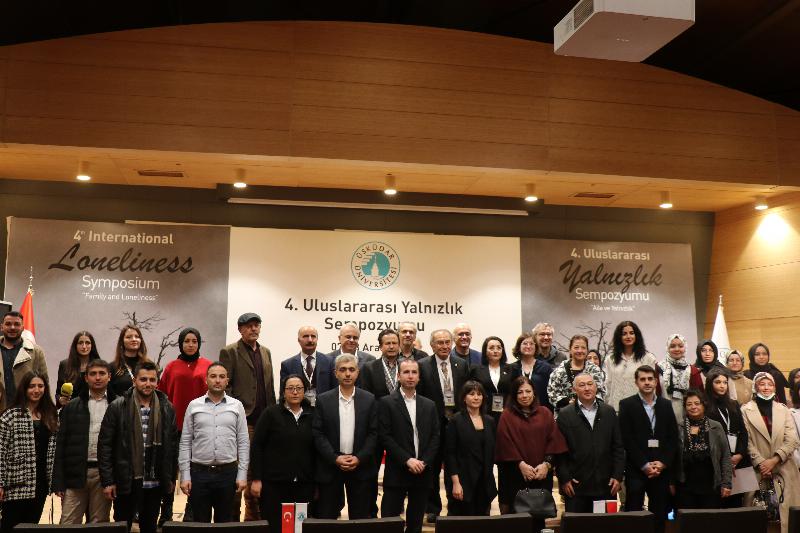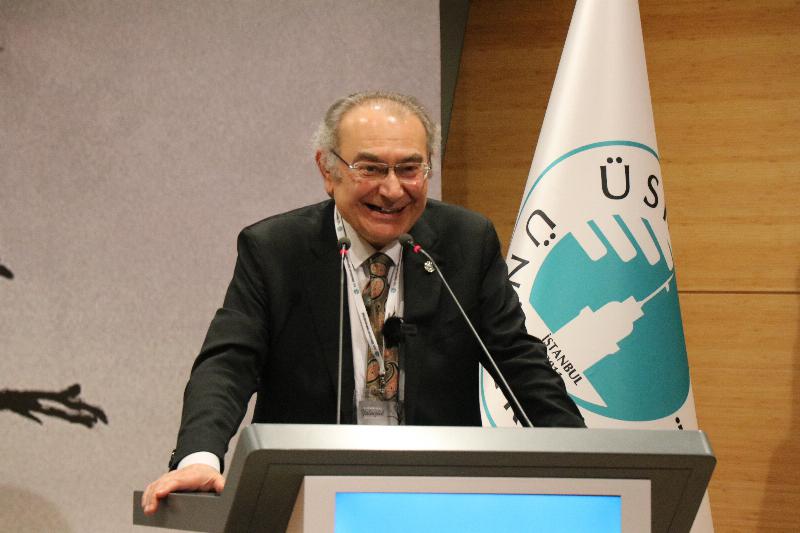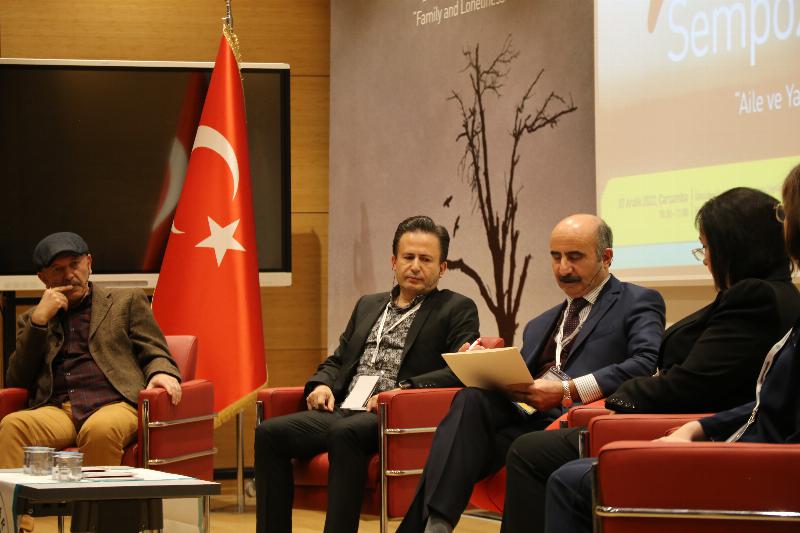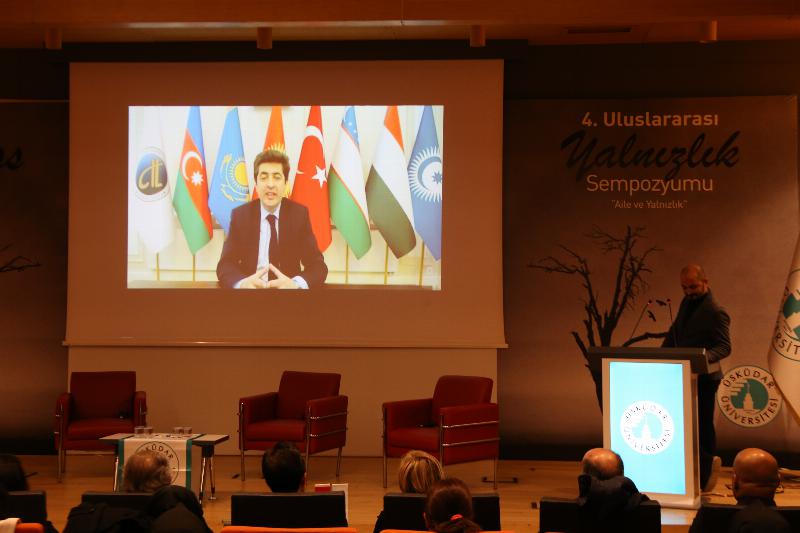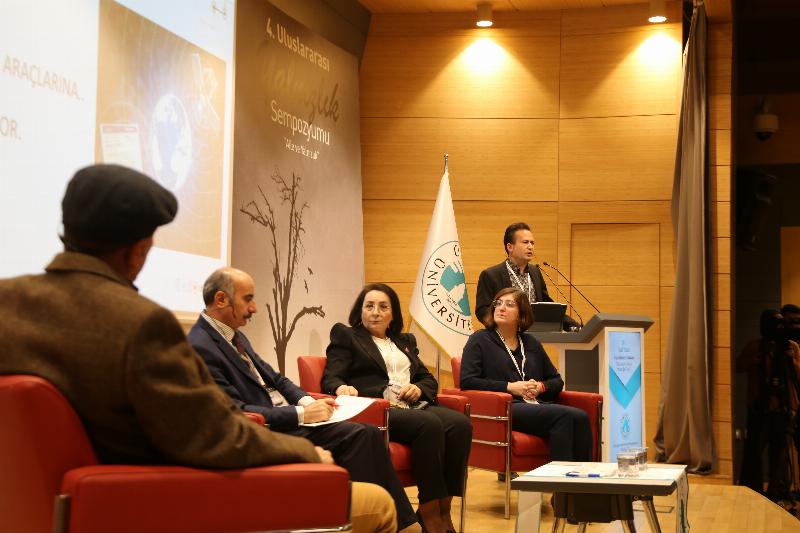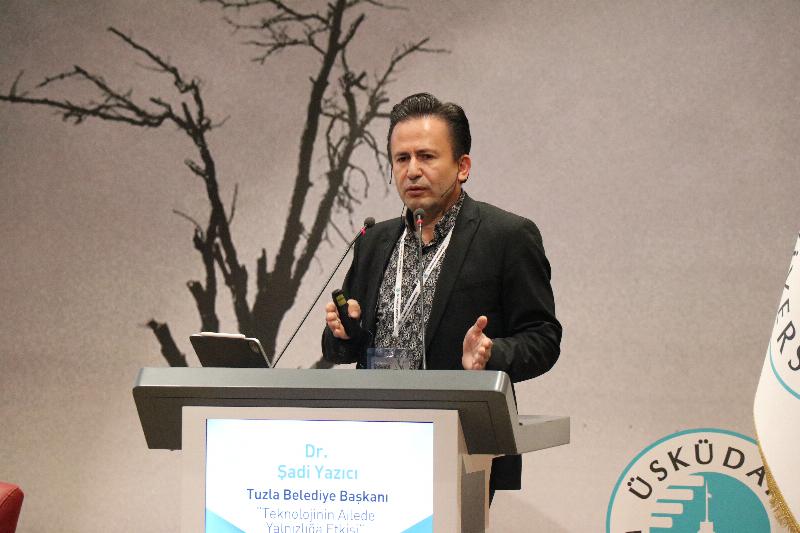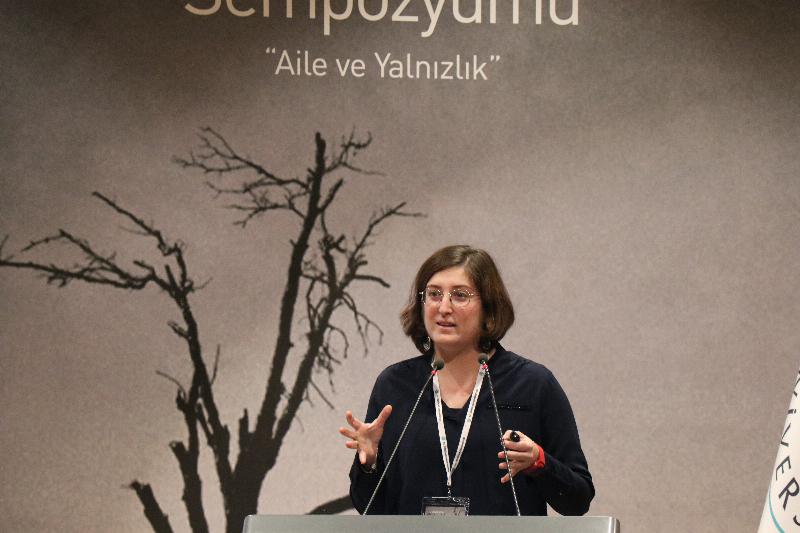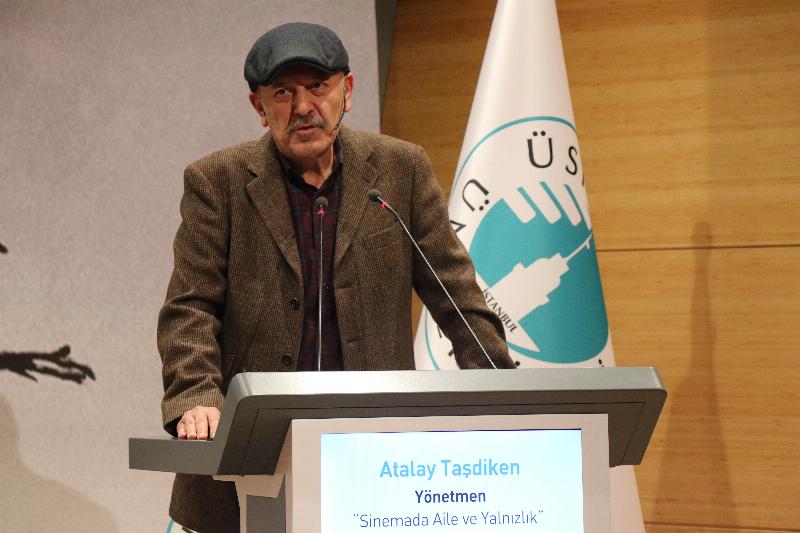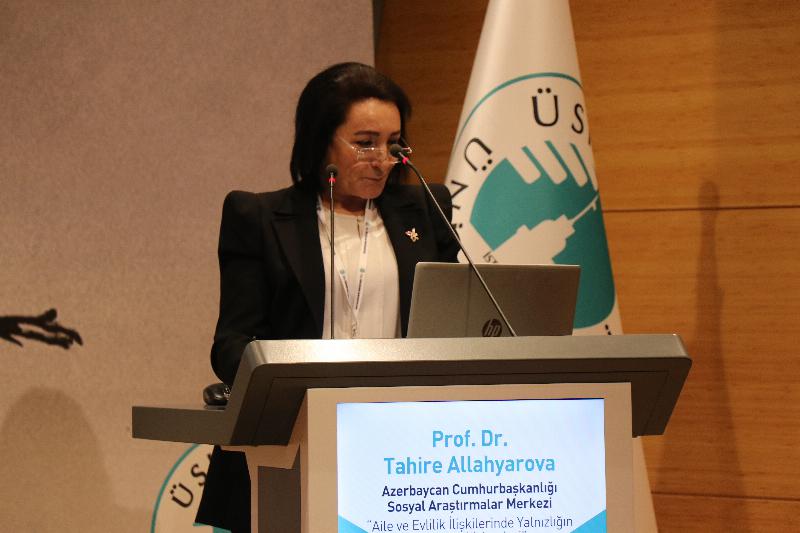4th Loneliness Symposium organized by Üsküdar University is being held with the theme of “Family and Loneliness” this year. President of Üsküdar University, Psychiatrist Prof. Nevzat Tarhan made opening remarks in the symposium and he emphasized the impact of the loneliness on family. Stating that “We must protect family and sustain the family values”, Tarhan said “when we look at the family values, we can say that the most important one is sharing. There must be complementary family relations instead of being competitive. The family values provided by the modernism are based on competition.”. The symposium that 30 important names from 8 countries participated, will continue for two days under the coordinatorship of Prof. Ebulfez Süleymanlı.
The symposium held between December 7-8, 2022 discusses the loneliness felt in today’s families and effects of technology on loneliness with the participation of scientists and academicians from France, Austria, Kazakhstan, Azerbaijan, Kirgizstan, Uzbekistan and Türkiye.
Prof. Nevzat Tarhan: “Loneliness is a serious and global problem”
President of Üsküdar University, Psychiatrist Prof. Nevzat Tarhan made opening remarks in the symposium the symposium held in Üsküdar University Main Campus Nermin Tarhan Conference Hall and started his words by emphasizing that loneliness is a serious and global problem Prof. Nevzat Tarhan said: “There are quite serious findings on loneliness. Manchester University and BBC carried out a joint study with the participation of about 50 thousand people in 2018 before the pandemic. In that study, 27% of the public over age 75 and 40% of the public age between 16-24 said ‘I am very lonely’. A very surprising result was shown. It is highly possible that those rates have increased. The loneliness in the advanced age is a big problem, it is seen that the suicide rate in the advanced age group is increased. A Ministry of Loneliness was founded in Japan since the suicide rates increased.”.
Prof. Nevzat Tarhan: “Japan sought solution for loneliness with ‘Chatroom’”
Stating that they participated in the N20 Neuroscience Summit held in Osaka within the scope of the G20 in 2019 just before the pandemic, Prof. Nevzat Tarhan said: “We saw a room written chatroom while we were walking down the Street. We wondered why there was a room like this and asked about it. Two people that they do not know each other, enter into that room and they leave after they chat. We learned that it was a project created as a solution for loneliness. Technology has been never in humans’ lives as much as now. It is very important that sociology discusses this since it is in the areas of interest of this field.”.
Prof. Nevzat Tarhan: “Technology accelerated the loneliness”
Expressing that they are researching ‘where is the society led to globally?’, they published the finding and they hope that those who determine social policies will pay attention to it, Prof. Nevzat Tarhan said: “We saw that technology facilitates the lives of humans but it accelerates loneliness in these studies. In another study in the USA, face-to-face meetings among 6th, 9th and 12th grade studies were followed. The rate of young people who says ‘I meet face-to-face everyday’ has decreased below 30% from 1980 to 2015. Today, there is no socializing. There are just some meetings under the name of socializing. It is a question of unsafe relations by changing identity with different names.”.
Prof. Nevzat Tarhan: “Homes are not safe areas anymore with smart phones”
Prof. Nevzat Tarhan pointed out that homes are becoming not to be a safe area with smart phones and continue to Express: “Social norms in the society were walls that protects the society, however, now those walls collapsed. Family was the last safe are in terms of safety. Now, it also collapsed with modern technologies because social norms and family norms have changed. Now, norms of a human also has begun to change. A new human type is awaiting us in the future. It does not sound shocking anymore that the world goes towards a digital dictatorship. A human-focused world must be established within this framework, now human-centered. We do not call it as human-centered because humans destroy the nature since they have free will and they do not think about the future generations. This loneliness study is not for our generation but for the next generations. We must take measurements in advance for the threats that waits our next generations. We can intervene very well when a crisis outburst however our preventative intervenes are weak. Unfortunately, this is a characteristic of the East communities.”.
Prof. Nevzat Tarhan: “When hedonism and narcissism are combined, this causes loneliness”
Emphasizing that societies go towards a storm and sociologists and psychiatrists must pay attention in order not to be caught by the storm, Prof. Nevzat Tarhan said “A syndrome is defined regarding this in the USA. It is called as California Syndrome since it is the place where loneliness is felt the most. Homeless people live under the building of Facebook in San Francisco. It is very hard to find a homeless person despite of the inequality of income. We do not come across quite this in the East communities. We cannot know that what the future will bring if we do not take measures. The French Revolution began due to the extreme inequality of income. The California Syndrome has four characteristics. The first one is hedonism. Hedonism presented the ideal of the ego as chasing after pleasure and we have begun to see its examples more clearly now. It used to be less. A person sees everything as a threat if it takes their pleasure away. It is tried to teach that handicaps are not threats but opportunities in the third-generation psychotherapies. Another result of the demonism is that the self-centeredness has emerged. Narcissism is also seen here. The person thinks that the world revolves around them and sees that their interest is the only high value. When hedonism and narcissism are added together, loneliness emerges as a result.”.
Prof. Nevzat Tarhan: “Loneliness is the destiny of self-centered people”
Indicating that loneliness is the destiny of self-centered people, Prof. Nevzat Tarhan expressed: “a human is a relational existence and the biggest need for them is a relationship. There is a genetic aspect of the need for relationship. There is a hormone coming from creation fort he need of relationship. This hormone is oxytocin. The hormone of oxytocin is released the most in the nursing mothers. It is also called as attachment and love hormone. They sell oxytocin as artificial sprays in Sweden. Married couples use this spray by applying it on their nose to hug each other more genuinely. A person can actually produce this hormone in their brain naturally.”.
Prof. Nevzat Tarhan: “Narcissism is a sort of social cancer”
Highlighting that individualization and gaining autonomy are encouraged in this age, Prof. Nevzat Tarhan said “However, this does not mean to get rid of responsibilities. Humanity must learn the balance between freedom and responsibility. When a person says ‘I am free.’, they must be able to both free and to belong to their family. That is, a person must establish this balance. Freedom must not mean limitlessness and being free from responsibilities. The freest cell is the cancer cell. Those who want freedom in an anarchist level like a cancer cell can cause a sort of social cancer. Narcissism is a sort of social cancer. It leads to the melting of the social structure and then to its collapse. When hedonism, narcissism and loneliness gathered together, these become the trinity of darkness and they lead to unhappiness and depression.”.
Prof. Dr. Nevzat Tarhan: “Modernism presents us competitive family relations”
Stating that antidepressants is seen in the sewer systems of Manhattan Prof. Nevzat Tarhan completed his words as follows:
“They see that antidepressants are flowing like a water in the sewers. We must not be mistaken by the Hollywood movies. People are trying to keep themselves on their feet with medication. We can understand that the cruel, competitive and self-centered system does not make people happy. People now must learn to establish healthy relations. This is a global problem. The increase in the global suicide rates is closely related to this situation, as well. It is great that our Sociology Department organized this year’s symposium with the theme of family because the family is the last safe area. We say that the family is the last safe area for the youth. We must protect and sustain the family values. When we look at the family values, we can say that the most important one is sharing. There must be complementary family relations instead of being competitive. The family values provided by the modernism are based on competition. A discourse such as ‘my money, your money, what you say, what I say’ experience a power and ego war. Instead of this, it must be said that ‘Marriage is a ship and a ship has a goal. I can put my interests for the sake of this ship and my children.’. If you say that ‘first me and then the ship’, that marriage cannot move forward in a healthy way. This kind of relationships used to be done in the past and women have paid the price for it, however, it cannot be like that anymore.”.
Prof. Ebulfez Süleymanlı: “This year, loneliness will be discussed through family institution”
Chairperson of Symposium Organizing Committee Üsküdar University, Institute of Social Sciences (ISS), Head of the Sociology Department Prof. Ebulfez Süleymanlı made his opening remarks by participating online from Astana which is the capital of Republic of Kazakhstan. In his opening remarks, he said that they will examine and evaluate loneliness which has become a social phenomenon of the modern age, through family institutes in this year’s symposium.
Prof. Ebulfez Süleymanlı: “New phenomena like loneliness have begun to be seen in a family”
Prof. Ebulfez Süleymanlı said that family institutions have had function of supporting individuals both emotionally and socially by creating a safe area throughout history; however, it is observed that the effect of the family is getting decreased on the elimination of loneliness and insecurities of individuals, today. Prof. Ebulfez Süleymanlı said: “Research show that the time spent together with family members transforms into the time spent alone by decreasing due to family relations that change with the spread of digital technologies in our everyday lives. It indicates new phenomena such as loneliness and loneliness within family with this kind of examples. The relation between family and loneliness also comes across as an important topic that much be examines through immigration, gender, elderliness, education and similar aspect besides digitalization.” Stating that they have carried out a research in 81 provinces with a broad participation this year as similar to previous years and they will share the results, Prof. Ebulfez Süleymanlı said that about 30 politicians and scientists from 8 different countries, NGO representatives and artists will participate as spokesperson in the symposium.
Technology, Family and loneliness were discussed in the first session
Üsküdar University, Advisor to Rector Prof. Sırrı Akbaba shared his remarks under the title of “Unknown Sides of Family Loneliness” in the first session that he is in charge of moderatorship. Prof. Sırrı Akbaba said that lack of social skills leads to loneliness.
Dr. Şadi Yazıcı emphasized the controlled usage of technology
Mayor of Tuzla Dr. Şadi Yazıcı emphasized the importance of the controlled usage by expressing that all positive and negative effects have spread to family and society with the development of technology in the speech titled “The Effect of Technology on Loneliness in Family”. Prof. Tahire Allahyarova from Centre for Social Research – Azerbaijan mentioned effects of loneliness on Azerbaijani society and family institutions in the speech titled “Social Variables of Loneliness in Family and Marriage Relationship”. Awarded director Atalay Taşdiken presented examples from movies from Turkish and world cinema which discusses immigration, urbanization and loneliness in the speech titled “Family and Loneliness in Cinema”.
Results of Digitalization and Loneliness Research - Türkiye were shared.
“Results of Digitalization and Loneliness Research – Türkiye” that was carried out in cooperation between Prof. Ebulfez Süleymanlı from Üsküdar University and Method Research Company, was shared at the end of the first session. The study drew attention with its striking results, which 6 thousand 100 people between age 18 – 70 participated in around Türkiye.
The first session broadcasted live on Üsküdar University YouTube channel and ÜÜ TV was ended with the presentation of certificates of appreciation to the participants and with photo shoot.
Overcoming with loneliness was told
In the second session of the first day, Assoc. Prof. Melis Oğuz from Beykent University performed moderatorship. She shared her presentation titled “Mothers of Berlin Neukölln Neighborhood: Overcoming Strategies of Loneliness of Immigrant Women”. In the second session, those who participated with their presentations are as follows: Prof. Hasan Bacanlı from Fatih Sultan Mehmet Foundation University with his presentation titled “Current Status of the Family and Loneliness”, Psychologist Hatice Tongar with her presentation titled “Loneliness of Gen Z”, Specialist Social Researcher Burcu Kılıç Gündür from Üsküdar Public Hospital with her presentation titled “Kimseli Kimsesizler (The Lonely without being Alone)” and Kalben Foundation Director Pelin Çalışkanoğlu Ekşi with her presentation “Loneliness of Children who grew in a Guardian Family”. The first day of the Symposium ended after the second session.
Foreign participants will tell the loneliness in the world
In the first session will start under the moderatorship of Prof. Ebulfez Süleymanlı on the second day of symposiums. Prof. Tamara Rostovskaya and Assoc. Prof. Ekaterina A. Knyazkova from Institute for Demographic Research of the Federal Center of Theoretical and Applied Sociology of the Russian Academy of Sciences will participate with the presentation titled “Loneliness within Family: Close but not Together”. Those who will participate with their presentations as follows: Prof. Nigina Rahimova “Social İdea” Public Research Center – Uzbekistan with the presentation titled “Is loneliness a current problem for Uzbek families?”, Prof. Rita Salmorbekova from Kirgizstan National Sciences Academy, Philosophy Law and Political Research Institute with the presentation titled “Loneliness as a Social Problem in Kirgizstan”, Assoc. Prof. Aygün Halilkızı from Bakü Public University Department of Philosophy with the presentation titled “Sociocultural Change and Incompatibility Problem as a Reasons for Isolation of Family: A Case Study of Azerbaijani Family “and Aizhan Duisembayeva from International Turkish Academy with the presentation titled “Loneliness Problem in Families in Kazakhstan: Socio-psychology Evaluation”.
Gözde Courbis Poncet will attend the first session from France and will perform the presentation titled “Silence in Family: Loneliness Experience of Foreign Country Citizens living in France”.
Academicians will interpret loneliness from different perspectives
In the second session of the 4th Loneliness Symposium, Prof. Cengiz Çakmak from İstanbul University will be moderator and will make his speed titled “Microwave and Conservatism in the Digital (finger) World”. Those who will participate with their presentations as follows: Assoc. Prof. Gülsüm Depeli from Hacettepe University with the presentation titled “Family as Isolation Ideology: Inside and Outside”, Assoc. Porf. Faruk Yaylacı from Kütahya Dumlupınar University with the presentation titled “Loneliness as a Remediless Strategy and Responsibility of Education”, Assoc. Prof. Taner Atmaca from Düzce university and Asst. Prof. Ayşegül Övdür Altundal from Bolu Abant İzzet Baysal University with their presentation titled “Children of Fragmented Families and Education: Analysis of Several Problems reflecting to Schools”.
In the third session, Psychiatrist Dr. Fatma Tuba Aydın Mentschl will attend from Austria with her presentation title “Loneliness of Immigrant Children”. The last session of the symposium will be held under the moderatorship of Prof. Zafer Danış from Sakarya University. Those who will participate in the third session with their presentation as follows: Prof. Gülay Günay from Karabük University with the presentation titled “Loneliness in Elderliness and Importance of the Family as a Social Support”, Asst. Prof. Talip Yiğit from İstanbul 29 Mayıs University with the presentation titled “Complexity of Elderliness: Is elderliness a Choice or is it an Objective Reality?”, Asst. Prof. Nesim Aylvarcı from Sakarya University with the presentation titled “Loneliness in Elderliness and Social Isolation” and Asst. Prof. Nihan Kalkandeler Özdin with the presentation titled with “ Empty Home Syndrome”.
4th International Loneliness Symposium will be ended with the closing speech by Chairperson of Symposium Organizing Committee Prof. Ebulfez Süleymanlı.
Üsküdar News Agency (ÜNA)


